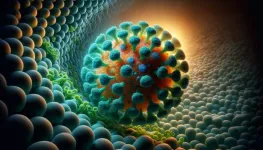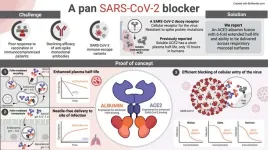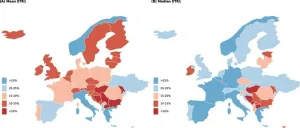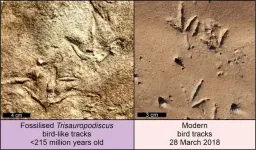(Press-News.org) A recent groundbreaking study, published in Nature Nanotechnology, sheds new light on the coronavirus's behavior, particularly its ability to remain attached under various mechanical stresses and the implications for person-to-person transmission. The paper, titled “Single-molecule force stability of the SARS-CoV-2–ACE2 interface in variants-of-concern,” is the result of a collaborative effort led by scientists from Auburn University, Ludwig Maximilian University of Munich, and Utrecht University. This research offers an unprecedented molecular-level understanding of the virus and raises the possibility of future variants combining Omicron's features with increased attachment stability, potentially leading to higher transmissibility.
The study focuses on understanding the strength of adhesion of different COVID-19 variants to human cells and the impact of this adhesion on the virus's spread. A key finding is the Alpha variant's stronger cell adhesion, which may contribute to its rapid transmission. In contrast, variants like Beta and Gamma, which are adept at evading immune responses, do not exhibit this increased attachment, affecting their spread differently among populations. The researchers suggest that future variants could merge strong attachment properties with other beneficial traits, potentially leading to faster transmission rates.
Significant contributions to this study came from Auburn University's Computational Biophysics Group, led by Prof. Bernardi. Key members, postdoctoral researchers Dr. Priscila Gomes and Dr. Marcelo Melo, delved into the atomic structure of the SARS-CoV-2 Spike protein and its interaction with human cells' ACE-2 protein. Their findings reveal that mutations in variants like Alpha, Beta, Gamma, Delta, and Omicron significantly change the virus's attachment strength to host cells.
Dr. Gomes highlights the importance of understanding how mutations structurally impact the interaction between current and future variants and human proteins. Dr. Melo, meanwhile, developed new methods to analyze extensive molecular dynamics simulations data, offering detailed insights into the specific roles of amino acid residues in the Spike protein's binding interface.
Dr. Bauer, who initiated this project during his graduate studies at LMU Munich and completed it as a postdoctoral researcher at the University of Washington, led the experimental aspect of the study. His innovative approach in examining the force stability of the virus's interaction with human cells revealed previously unseen single-molecule patterns.
This study exemplifies the power of international scientific collaboration, involving researchers across three countries. It underscores the vital role of young scientists in advancing research. Prof. Bernardi praises the team's dedication in developing new analytical tools and novel data correlation methods to understand the molecular details of this protein complex.
The findings also highlight the College of Sciences and Mathematics at Auburn University's commitment to developing a robust Biophysics Cluster. This initiative, involving the Departments of Physics, Chemistry and Biochemistry, and Biological Sciences, is dedicated to pioneering research that unravels the complexities of biological systems at the molecular level.
END
Catalysts of change: Young scientists spearhead breakthrough COVID-19 research in international collaboration
Molecular biophysics study investigates how coronavirus’ variants of concern attachment strength to human cells influences COVID-19's spread and transmissibility
2023-11-29
ELSE PRESS RELEASES FROM THIS DATE:
With some forms of TBI, non-deployed vets have higher risk of epilepsy than deployed
2023-11-29
EMBARGOED FOR RELEASE UNTIL 4 P.M. ET, WEDNESDAY, NOVEMBER 29, 2023
MINNEAPOLIS – A study of post-9/11 veterans shows that those with moderate or severe traumatic brain injury (TBI) who have never been deployed have a higher risk of epilepsy than those who have been deployed. The study is published in the November 29, 2023, online issue of Neurology®, the medical journal of the American Academy of Neurology.
“We anticipated that deployment would be linked to a higher risk of epilepsy among post-9/11 veterans with TBI given the potential higher risk for a blast or combat ...
Certain migraine medications may be more effective than Ibuprofen
2023-11-29
EMBARGOED FOR RELEASE UNTIL 4 P.M. ET, WEDNESDAY, NOVEMBER 29, 2023
MINNEAPOLIS – For many people with migraine, it can be difficult to find a treatment that is effective and reliable, and information on how medications compare to one another is lacking. A new study draws data from nearly 300,000 people using a smartphone app to help people make decisions about their medications. The study found that certain migraine medications like triptans, ergots and anti-emetics may be two to five times more effective than ibuprofen ...
Embedding fibers to undo the tapestry of memory loss in Alzheimer's disease
2023-11-29
Every 65 seconds, someone in the United States develops Alzheimer’s disease, a devastating form of dementia that affects 6.2 million Americans.
Though it was initially identified almost 120 years ago, Alzheimer’s disease is a progressive neurological disorder with no cure and few treatments. It starts out with minor memory loss that, over time, advances to a mental decline so severe, individuals have difficulty even swallowing.
Xiaoting Jia, associate professor in the Bradley Department of Electrical ...
Novel study finds aspirin-free regimen benefits patients with LVAD
2023-11-29
The ARIES-HM3 Randomized Clinical Trial assessed the safety and efficacy of excluding aspirin from the antithrombotic regimen in patients with advanced heart failure who have undergone implantation of a fully magnetically levitated left ventricular assist device (LVAD).
“We can now safely say that not giving aspirin is not only safe from a thromboembolic risk profile but results in improved adverse event rate by a significant reduction in non-surgical bleeding which is a well-known complication related to LVAD therapy,” said Mirnela Byku, M.D., Ph.D., MBA, co-author of the study and director of the UNC Durable Mechanical ...
Your local sea snail might not make it in warmer oceans – but oysters will
2023-11-29
The frilled dog winkle may sound like a complex knot for a tie, but this local sea snail holds clues to our warmer future, including a dire outlook for species that can’t move, adapt, or acclimate as fast as their environment heats up.
Strait of Georgia hotspot
To figure out how location affects vulnerability to a changing climate, UBC zoology researchers Drs. Fiona Beaty and Chris Harley collected marine snails from the Strait of Georgia, a potential hot spot of climate risk, and the Central Coast, where waters are cooler and warming more slowly.
They monitored snails ...
600 years of tree rings reveal climate risks in California
2023-11-29
The San Joaquin Valley in California has experienced vast variability in climate extremes, with droughts and floods that were more severe and lasted longer than what has been seen in the modern record, according to a new study of 600 years of tree rings from the valley.
The researchers used the tree rings to reconstruct plausible daily records of weather and streamflow scenarios during the 600-year period.
This new approach, combining paleo information with synthetic weather generation, may help policymakers and scientists better understand – and anticipate ...
Big cities foster socioeconomic segregation; Here’s how we can fix that
2023-11-29
We tend to think of large cities as melting pots – places where people from all sorts of backgrounds can mingle and interact. But according to new research, people in big cities tend to primarily interact with other individuals in the same socioeconomic bracket, whereas people in small cities and rural areas are much more likely to have diverse interactions.
Using cellphone data, a collaboration of researchers led by Stanford University determined that most people in big cities have very few opportunities for even brief interactions with those outside their own socioeconomic status. ...
A long-acting biologic with transmucosal transport properties that arrest SARS-CoV-2 virus variants
2023-11-29
When the COVID-19 pandemic first started, no effective anti-viral drugs were available to fight the disease. However, in record time, so-called monoclonal antibodies were developed as a lifesaving treatment. Now, 3 years later, none of the approved antibodies work effectively against the new SARS-CoV-2 virus variants due to mutations that alter their spike protein.
While vaccines protect against severe disease, there is still an urgent need for effective virus-blocking agents for therapeutic or prophylactic use. This is particularly relevant for patients ...
Study reveals the real tax rate paid by multinational corporations in 47 countries
2023-11-29
Despite a similar statutory tax rate for multinational corporations (MNCs) across many countries, the effective tax rate that MNCs actually pay differs greatly — as low as 1% of gross income in Luxembourg and as high as 67% in Norway. That’s one conclusion of a study published this week in the open-access journal PLOS ONE by Javier Garcia-Bernardo of Utrecht University, the Netherlands, Petr Janský of Charles University, Czechia, and Thomas Tørsløv of Danmarks Nationalbank, Denmark. The study comes on the ...
Unknown animals were leaving bird-like footprints in Late Triassic Southern Africa
2023-11-29
Ancient animals were walking around on bird-like feet over 210 million years ago, according to a study published November 29, 2023 in the open-access journal PLOS ONE by Miengah Abrahams and Emese M. Bordy of the University of Cape Town, South Africa.
Numerous fossil sites in southern Africa preserve distinctive three-toed footprints that have been named Trisauropodiscus. For many years, researchers have debated what animals might have left these tracks, as well as precisely how many different species (technically called ichnospecies) of Trisauropodiscus there are.
In this study, the researchers reassessed the ...
LAST 30 PRESS RELEASES:
Antarctica sits above Earth’s strongest “gravity hole.” Now we know how it got that way
Haircare products made with botanicals protects strands, adds shine
Enhanced pulmonary nodule detection and classification using artificial intelligence on LIDC-IDRI data
Using NBA, study finds that pay differences among top performers can erode cooperation
Korea University, Stanford University, and IESGA launch Water Sustainability Index to combat ESG greenwashing
Molecular glue discovery: large scale instead of lucky strike
Insulin resistance predictor highlights cancer connection
Explaining next-generation solar cells
Slippery ions create a smoother path to blue energy
Magnetic resonance imaging opens the door to better treatments for underdiagnosed atypical Parkinsonisms
National poll finds gaps in community preparedness for teen cardiac emergencies
One strategy to block both drug-resistant bacteria and influenza: new broad-spectrum infection prevention approach validated
Survey: 3 in 4 skip physical therapy homework, stunting progress
College students who spend hours on social media are more likely to be lonely – national US study
Evidence behind intermittent fasting for weight loss fails to match hype
How AI tools like DeepSeek are transforming emotional and mental health care of Chinese youth
Study finds link between sugary drinks and anxiety in young people
Scientists show how to predict world’s deadly scorpion hotspots
ASU researchers to lead AAAS panel on water insecurity in the United States
ASU professor Anne Stone to present at AAAS Conference in Phoenix on ancient origins of modern disease
Proposals for exploring viruses and skin as the next experimental quantum frontiers share US$30,000 science award
ASU researchers showcase scalable tech solutions for older adults living alone with cognitive decline at AAAS 2026
Scientists identify smooth regional trends in fruit fly survival strategies
Antipathy toward snakes? Your parents likely talked you into that at an early age
Sylvester Cancer Tip Sheet for Feb. 2026
Online exposure to medical misinformation concentrated among older adults
Telehealth improves access to genetic services for adult survivors of childhood cancers
Outdated mortality benchmarks risk missing early signs of famine and delay recognizing mass starvation
Newly discovered bacterium converts carbon dioxide into chemicals using electricity
Flipping and reversing mini-proteins could improve disease treatment
[Press-News.org] Catalysts of change: Young scientists spearhead breakthrough COVID-19 research in international collaborationMolecular biophysics study investigates how coronavirus’ variants of concern attachment strength to human cells influences COVID-19's spread and transmissibility





